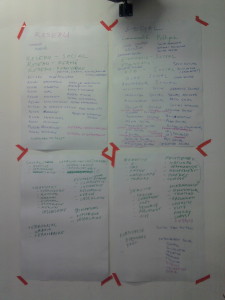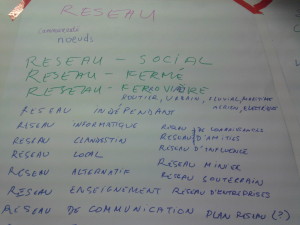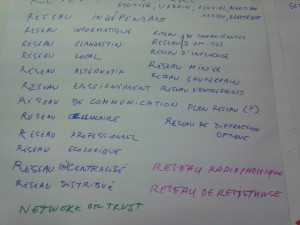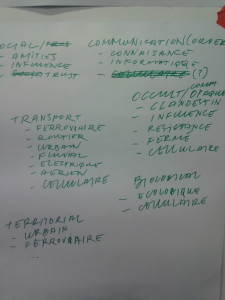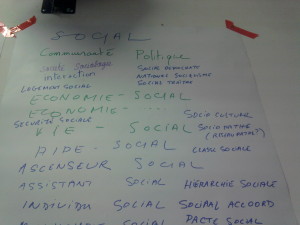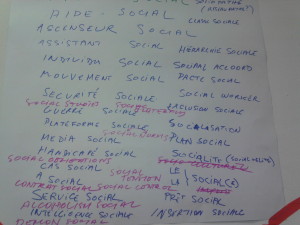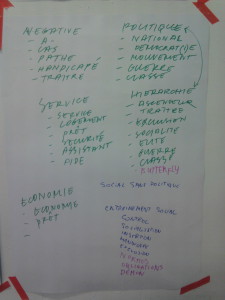RÉSEAU, subst. masc.
Étymol. et Hist. A. 1. Ca 1180 resel « petit filet utilisé pour la chasse et la pêche » (Marie de France, Fables, éd. A. Ewert et R. C. Johnston, 12, 39: as cordes … e as resels); ca 1300 (Macé, Bible, 14283, éd. A. M. L. Prangsma-Hajenius, t. 3, p. 68b: a reseaux); 2. 1225-30 fig. (Guillaume de Lorris, Rose, éd. F. Lecoy, 1438: Narcisus … qui Amors tint en ses raisiaus). B. 1. 1599 réseau « tissu en forme de rets » ([Inventaire des biens meubles, joyaux et titres de Gabrielle d’Estrées], Arch. nat. KK 157, f o46 v ods Gay), 2. 1694 dentell. (Ac.: dentelle à fond de reseau); 1754 (Encyclop. t. 4, p. 847a, s.v. dentelle: la neige, le réseau, la bride). C. 1. 1690 zool. « deuxième poche de l’estomac des ruminants » (Fur.); 2. a) 1748 anat. réseau merveilleux (Dict. universel de méd., trad. de l’angl. de M. James, t. 5, p. 1099a, s.v. rete mirabile); 1805 réseau admirable (Cuvier, Anat. comp., t. 2, p. 185); b) 1762 anat. « ensemble de vaisseaux sanguins » (Ac.); 3. 1762 « ensemble de lignes, de bandes, etc., entrelacées ou entrecroisées » (J.-J. Rousseau, Émile, l. III, éd. Ch. Wirz, Bibl. Pléiade, p. 431: un brillant rézeau de rosée); 4. 1763 hérald. (Encyclop. Planches t. 2, Art hérald., pl. XI, n o579); 5. 1835 géod. (Ac.: réseau de triangles); 6. a) 1839 art « filets de plomb d’un vitrail » (Balzac, loc. cit.); b) 1856 archit. « nervures de pierre d’une fenêtre ou d’une rose gothique » (Lenoir, Archit. monast., p. 196); 7. ca 1893 « écran utilisé en photogravure » (Gde encyclop., t. 19, p. 1031, s.v. héliogravure); 8. 1915 art milit. (Bourget, Sens mort, p. 192: réseau de fils de fer; p. 193: réseau barbelé). D. 1. 1828 « ensemble de personnes, d’organismes, en relation pour agir ensemble » (Guizot, Hist. civilis., leçon 2, p. 16: un réseau de fonctionnaires); 2. a) 1922 « organisation clandestine » (Giraudoux, Siegfried et Lim., p. 39: un réseau d’espions); b) 1946 « organisation de résistants » (Abellio, Pacifiques, p. 387); 3. 1932 comm. (Pesquidoux, Livre raison, p. 197); 4. 1964 psychol. soc. réseau de communication (C. Flament, Réseaux de communication et structure de groupe, Aix en Provence ds Encyclop. univ. t. 4, p. 768a). E. 1. 1829 phys. (J. Babinet, Sur les couleurs des réseaux ds Ann. chim. et phys., t. 40, p. 166); 1892 réseau de diffraction (Guérin); 2. 1849 cristallogr. (Rapport sur un Mém. de M. Bravais ds C.r. de l’Ac. des sc., t. 29, p. 134); 1899 réseau cristallin (Lapparent, Minér., p. 11); 3. 1964 électr. « combinaison de générateurs et d’éléments possédant une résistance, une inductance, une capacitance, etc. » (Rob.). F. Ensemble de lignes, de voies de communications, de conducteurs, etc. 1. a) 1842 ch. de fer (Hugo, Rhin, p. 481: que le réseau des innombrables sillages de toutes les marines se joigne […] au réseau de tous les chemins de fer [ici, p. métaph.]); 1844 (Le Compilateur, n o19, 5 oct., p. 306 ds Quem. DDL t. 25); b) 1842 mar. (Hugo, loc. cit.); 1870 (Littré); c) 1870 transp. routiers (ibid.); d) 1890 aéron. (Ledieu, Cadiat, Nouv. matér. nav., p. 323: réseau de communications aériennes [par ballons]); 1931 (Saint-Exup., Vol nuit, p. 96: le réseau de la compagnie); 2. a) 1849 télégr. (L. Figuier, La Télégr. électr., in R. des deux mondes, 3esérie, p. 614 ds Quem. DDL t. 6); b) 1882 téléph. réseau téléphonique (L’Année sc. et industr., 25eannée, p. 133); c) 1958 réseau de télévision (Matras, op. cit., p. 102); d) 1962 réseau de radars (Goldschmidt, Avent. atom., p. 202); e) 1964 réseau radiophonique (Rob.); f) 1964 réseau hertzien (Lar. encyclop.); g) 1968 informat. (Lar. encyclop. Suppl., s.v. terminal: réseau de télétraitement); 3. 1874 réseau hydrographique (Verne, Île myst., p. 239); 4. a) 1905 pétrole (Haton de la Goupillière, Exploitation mines, p. 238: des réseaux de conduites, ou pipe-line); b) 1925 électr. (Pesquidoux, Livre raison, p. 189: répand [la réserve de courant] dans le réseau); c) 1928 (Lar. mén., p. 323: des réseaux de distribution d’eau, de gaz et d’électricité). Dér., au moyen du suff. -eau*, de l’a. fr. reiz, rez « filet » (rets*); réseau a été en concurrence avec réseul, réseuil (FEW t. 10, p. 337, s.v. retiolum) qu’il a fini par supplanter.
http://www.cnrtl.fr/etymologie/r%C3%A9seau



